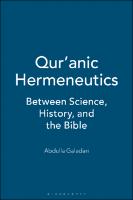Qur'anic Hermeneutics
Between Science, History, and the Bible
Abstract
This book is open access and available on www.bloomsburycollections.com. Qur'anic Hermeneutics argues for the importance of understanding the polysemous nature of the words in the Qur’an and outlines a new method of Qur’anic exegesis called intertextual polysemy. By interweaving science, history and religious studies, Abdulla Galadari introduces a linguistic approach which draws on neuropsychology. This book features examples of intertextual polysemy within the Qur’an, as well as between the Qur’an and the Bible. It provides examples that intimately engage with Christological concepts of the Gospels, in addition to examples of allegorical interpretation through inner-Qur’anic allusions. Galadari reveals how new creative insights are possible, and argues that the Qur’an did not come to denounce the Gospel–which is one of the stumbling blocks between Islam and Christianity–but only to interpret it in its own words.
Keywords
Social groups: religious groups and communities; The Koran (Qur’an); Criticism and exegesis of sacred textsDOI
10.5040/9781350070059ISBN
9781350070042, 9781350070035, 9781350070042Publisher
Bloomsbury AcademicPublisher website
https://www.bloomsbury.com/academic/Publication date and place
London, 2018Imprint
Bloomsbury AcademicClassification
Islam
The Koran (Qur’an)
Religion and science
Christianity
Criticism and exegesis of sacred texts


 Download
Download